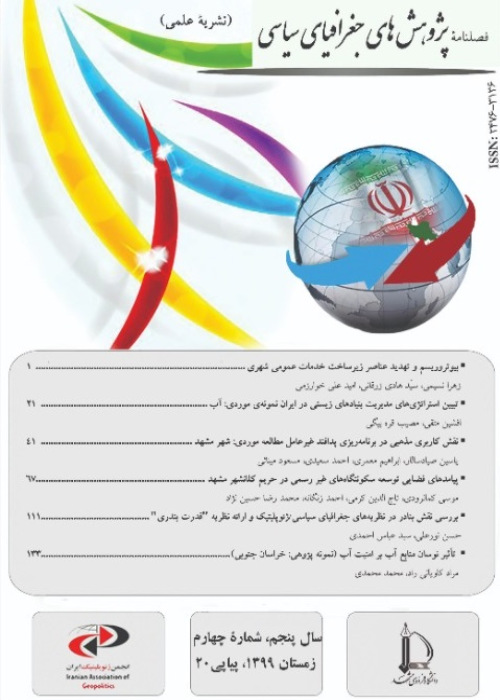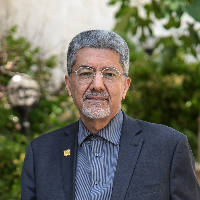Dominant Discourse to Globalization and City Development Policies, A Critic of Urban Investment Projects In Mashhad
Author(s):
Article Type:
Research/Original Article (دارای رتبه معتبر)
Abstract:
INTRODUCTIONGlobalization as a meta-process or a set of processes is largely accepted as free movement of capitals, goods, people, technologies, ideas, etc., all over the world. This time-space compression and formation of space of flow is changing our understanding of contemporary world, or in a better word, it compels us to think seriously about new ontology of space. At the same time, it is a fact that we are living in an urban era. Nowadays we can speak about planetary urbanization, and we can ask if there is any space which is not urban. No matter what we name them; concept, phenomenon, historical event or [meta]process, cities become the place of globaliztion. This leads to creat a body of studies in the urban domain. It is proclaimed that Iran, as a so-called developing oil-exporting country, with adherence to ideological government, is not part of this global space of flows or Actually Existing Neoliberalism. But it is possible to say that a process which compels us with a new ontology to space does not affect Iranian cities. We say NO. Hence, in this paper, the relationship between the globalization and Iranian cities raises a question. Then, the main question of this paper is as follows: Q: How does globalization affect Iranian cities?
METHODOLOGYThis paper is a theoretical one. We used discourse analysis in order to answer the research question. On the other hand, we used the spatial distribution of urban mega-project in Mashhad as the second most populated city of Iran to show the theoretical framework in an actual existing policy in an Iranian city. For the spatial analysis, we used Spatial Autocorrelation in software such as ArcGIS and GeoDa.
RESULTS & DISCUSSIONIts a belief that Iran is not part of the global space of flows. The minimum share of global capital circulation (Foreign Direct Investment is only 2 percent of Gross Fixed Capital formation in Iran) and the fact that Iran was ranked among the lowest countries in globalization indexes indicates its present position. Hence, Iranian cities are not considered as an actor in the global scale; none of the Iranian cities are in the world city network. Rennie Short named Tehran as a Black Hole; it is among eleven cities which met three criteria: they had a population of over 3 million, were not identified by GAWC as a world city and did not share their national territory with a world city.
There is a body of studies related to the globalization and cities in Iran. Most of them are dedicated to the dominant literature. They study the position of the Iranian cities in different rankings. They, generally, persist in the necessity of improving the position of Iranian cities in the global ladder of global cities. As a result, we can see urban reconstruction for globalization as the key agenda for urban planners and city authorities in Iran. Some others conclude the fact that Iranian cities are not part of space of flows is rooted in the Constitution, because it represents specific geo-political code which limits the capacity of cities to play an active role in space of flow and it is why Short put Tehran amongst Resisting Cities.
This conception of globalization, which itself is discursive, based on some statements. It is necessary to reconstruct the city for globalization and it is one of the most important statements in todays urban planning in Iran. We can claim that this statement is the planning habitus amongst Iranian planners and city authorities in Iran.
CONCLUSIONS & SUGGESTIONSThe dominant discourse of globalization, which is called as globalization of neoliberalism discourse, presents a linear-scalar interpretation. This discourse of globalization is shaping planning habitus amongst Iranian city authorities and planners. Iranian cities reconstructing based on globalization flow is a key statement for this discourse. Based on this common sense or habitus, cities compete to attract different form of capitals. On the mentioned statement, it is reasonable to accept that building high-tech global trade zones and investing urban mega-projects could help the process. This process will result in raising the position of Iranian cities among global cities. In this atmosphere, Islamic ideology and oil revenue are important issues in urban network of Iranian cities, for instance latter one play a major role in financing urban mega-projects.
All we have discussed here was about globalization and global scale. But local scale is also important. It is clearl that local communities continue to obtain political potential in the age of globalized power. Hence, the distinction between the local and the global as separate scalar fields remains problematic, as matters of the shifting boundary between a territorial inside and a territorial outside or as in here and out there.
Globalization and new communicational networks offer the potential of action at a distance and therefore we can suggest new type of community titled distanciated community in the open source neighborhoods. We could, thus, see localities as the sites of intersection and juxtaposition of new spatio-temporalities with older ones. Then we can speak about globalization in Iran Cities in different way (beyond studying Iranian cities in hierarchy of globalized city or studying APS spatial distribution).
METHODOLOGYThis paper is a theoretical one. We used discourse analysis in order to answer the research question. On the other hand, we used the spatial distribution of urban mega-project in Mashhad as the second most populated city of Iran to show the theoretical framework in an actual existing policy in an Iranian city. For the spatial analysis, we used Spatial Autocorrelation in software such as ArcGIS and GeoDa.
RESULTS & DISCUSSIONIts a belief that Iran is not part of the global space of flows. The minimum share of global capital circulation (Foreign Direct Investment is only 2 percent of Gross Fixed Capital formation in Iran) and the fact that Iran was ranked among the lowest countries in globalization indexes indicates its present position. Hence, Iranian cities are not considered as an actor in the global scale; none of the Iranian cities are in the world city network. Rennie Short named Tehran as a Black Hole; it is among eleven cities which met three criteria: they had a population of over 3 million, were not identified by GAWC as a world city and did not share their national territory with a world city.
There is a body of studies related to the globalization and cities in Iran. Most of them are dedicated to the dominant literature. They study the position of the Iranian cities in different rankings. They, generally, persist in the necessity of improving the position of Iranian cities in the global ladder of global cities. As a result, we can see urban reconstruction for globalization as the key agenda for urban planners and city authorities in Iran. Some others conclude the fact that Iranian cities are not part of space of flows is rooted in the Constitution, because it represents specific geo-political code which limits the capacity of cities to play an active role in space of flow and it is why Short put Tehran amongst Resisting Cities.
This conception of globalization, which itself is discursive, based on some statements. It is necessary to reconstruct the city for globalization and it is one of the most important statements in todays urban planning in Iran. We can claim that this statement is the planning habitus amongst Iranian planners and city authorities in Iran.
CONCLUSIONS & SUGGESTIONSThe dominant discourse of globalization, which is called as globalization of neoliberalism discourse, presents a linear-scalar interpretation. This discourse of globalization is shaping planning habitus amongst Iranian city authorities and planners. Iranian cities reconstructing based on globalization flow is a key statement for this discourse. Based on this common sense or habitus, cities compete to attract different form of capitals. On the mentioned statement, it is reasonable to accept that building high-tech global trade zones and investing urban mega-projects could help the process. This process will result in raising the position of Iranian cities among global cities. In this atmosphere, Islamic ideology and oil revenue are important issues in urban network of Iranian cities, for instance latter one play a major role in financing urban mega-projects.
All we have discussed here was about globalization and global scale. But local scale is also important. It is clearl that local communities continue to obtain political potential in the age of globalized power. Hence, the distinction between the local and the global as separate scalar fields remains problematic, as matters of the shifting boundary between a territorial inside and a territorial outside or as in here and out there.
Globalization and new communicational networks offer the potential of action at a distance and therefore we can suggest new type of community titled distanciated community in the open source neighborhoods. We could, thus, see localities as the sites of intersection and juxtaposition of new spatio-temporalities with older ones. Then we can speak about globalization in Iran Cities in different way (beyond studying Iranian cities in hierarchy of globalized city or studying APS spatial distribution).
Keywords:
Language:
Persian
Published:
Research Political Geography, Volume:1 Issue: 4, 2017
Pages:
1 to 20
magiran.com/p1793479
دانلود و مطالعه متن این مقاله با یکی از روشهای زیر امکان پذیر است:
اشتراک شخصی
با عضویت و پرداخت آنلاین حق اشتراک یکساله به مبلغ 1,390,000ريال میتوانید 70 عنوان مطلب دانلود کنید!
اشتراک سازمانی
به کتابخانه دانشگاه یا محل کار خود پیشنهاد کنید تا اشتراک سازمانی این پایگاه را برای دسترسی نامحدود همه کاربران به متن مطالب تهیه نمایند!
توجه!
- حق عضویت دریافتی صرف حمایت از نشریات عضو و نگهداری، تکمیل و توسعه مگیران میشود.
- پرداخت حق اشتراک و دانلود مقالات اجازه بازنشر آن در سایر رسانههای چاپی و دیجیتال را به کاربر نمیدهد.
In order to view content subscription is required
Personal subscription
Subscribe magiran.com for 70 € euros via PayPal and download 70 articles during a year.
Organization subscription
Please contact us to subscribe your university or library for unlimited access!



